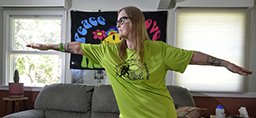
One of the most frequent complaints women have about midlife and menopause is trouble sleeping.
Although not every woman walks through my office door saying, “My problem is poor sleep,” quite a few do.
Many talk about their sleeping issues in other ways. What they say usually goes something like this:
“I am so irritable, I do not like myself.”
“I cannot seem to remember anything.”
“Why am I so tired?”
But I know the real problem is they are either not sleeping well or enough.
Sleep disturbances are common and have many causes. And, although I am not a sleep doctor, I have learned about sleep during midlife and menopause.
First of all, just before your periods, the hormone drop can cause little night sweats, which disturb sleep just enough to be noticeable. Many women also describe falling asleep without any problems, but then waking up between 1:30 a.m. and 2 a.m. and not being able to fall back asleep.
Does this scenario sound familiar? If so, keep reading.
Your normal sleep consists of cycles that vary between deep sleep and light sleep. When you are in light sleep, you can usually get yourself back into deep sleep without waking. However, in midlife and menopause, you are more likely to be awakened by a full bladder, your bed partner’s snoring or a little hot flash.
Unfortunately, once you are awake and alert, your brain tends to go into overdrive: “Oh, no, I’m awake—what if I can’t get back to sleep? I have a big day tomorrow, and I have so many things to do. There’s that big presentation, cookies for John’s class and my mom’s doctor’s appointment.”
The worry machine goes into high gear and the adrenaline starts flowing.
Here’s how to fix the problem. Get out of bed, go to the bathroom, get a drink of water and go to a quiet spot in your home (not the bedroom) to practice metered breathing.
First, find a comfortable spot with just enough light so it is not totally dark. Glance at the clock so you can keep track of the time. The goal is five minutes. After you are comfortable, close your mouth, open your eyes and find a focal point—a spot on the wall or anything fixed and neutral. As Baron Baptiste says, “By focusing on one spot, it will send soothing messages to your mind.”
Then, just breathe through your nose, not deep or forced. Just be and breathe, focusing on the sound of your breath for five minutes. If you think of something that is worrying you, it’s OK. Focus for a second on the thought and then let it go.
Then go back to bed. If you find you can’t go back to sleep, get back up, go to your spot and repeat the metered breathing. It may take your body several times to retrain. Just be patient.
In addition to metered breathing, keep in mind the Seven Essential Elements of Daily Success (SEEDS) that will help you sleep better and be ready for your day. Not doing these things will trigger more night sweats.
- Drink plenty of water
- Get plenty of sleep
- Take your vitamins daily
- Eat a balanced diet with minimal sugar, caffeine and alcohol several hours before bed
- Exercise regularly
- Eat plenty of fiber
- Start a gratitude journal
If you have tried the metered breathing and all of the SEEDS, and you’re still having trouble sleeping, it may be time to consult with a Spectrum Health Medical Group sleep specialist. Remember, sleep is everything.
 /a>
/a>
 /a>
/a>
 /a>
/a>
Sleep is so vitally important to everyone!! Getting enough sleep is what’s challenging in our busy lives. Great read!!